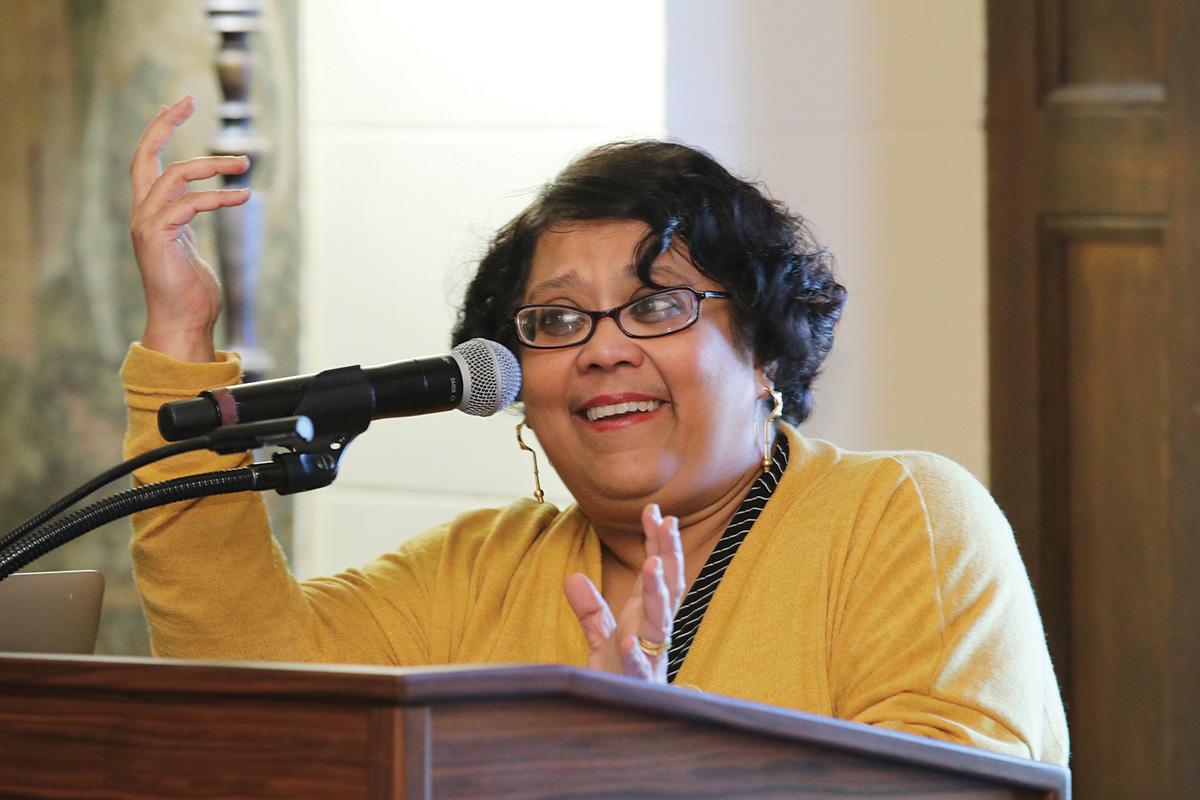
by Sangita Gopal, CSWS Director
At CSWS, 2021–22 has been a year of transitions and modulations, planning and restructuring, making do and looking ahead. I began the year as interim director, taking over from Michelle McKinley who led the Center with extraordinary vision, energy, and compassion for five years. During her tenure, she centered—through grants and events—cutting-edge interdisciplinary feminist and queer scholarship on race, diversity, the global South, and the environment, but she also worked tirelessly to build allies and alliances across the UO and other institutions. We are particularly grateful for her stewardship during the early days of the pandemic as she quickly pivoted Center activities and events online and, with the help of colleagues, initiated the Caregiver Campaign to direct institutional support to care work—the invisible burden of which disproportionately falls on women, communities of color, and other vulnerable constituents.
As interim, my charge was to transition us out of pandemic mode and resume in-person Center operations. While the Delta and Omicron surges in the fall and early winter did interfere with that plan, the Center is now up and running five days a week, and we really hope you will visit with us and help us to gear up for the 50th Anniversary in 2023–24! We have all manner of Center improvements planned, including a conversion of the Joan Acker room into a lounge space where feminists can gather, some needed technical upgrades to the Jane Grant Room, as well as a new and more user-oriented website that our dissemination specialist Jenée Wilde has been working very hard to put in place. I am also delighted to introduce to you our new part-time office assistant Rowen Pruett, who will be assisting our business manager Angie Hopkins with operations, accounts, and events. In the works, is the hiring of a project manager and new student internships to help us with planning and implementing the 50th Anniversary celebrations.
Re-engaging the campus community, helping faculty and graduate students to accelerate their research agendas, and preparing for the 50th Anniversary celebrations were our priorities for the past year, and we made significant headway in these initiatives. A retreat along with the results of a survey allowed us to brainstorm ideas and priorities as to how CSWS should celebrate these past 50 years, even as we begin to plan for the next 50. We returned with gusto to our Noon Talks where grantees discuss the fruits of their funded projects, and it has been our pleasure to learn about their cutting-edge research and engage in spirited discussions. We also re-energized our Research Interest Groups (RIGs) to further engage our community in the coming year, with some excellent projects to look forward to—including experimentally structured and performance-based RIGs on a range of topics from trans embodiment to decolonial feminisms.
Our events calendar kicked off in January with a livestream screening and discussion of the documentary film Ni una menos: Violence against women and justice in Guatemala, co-sponsored by the Center for Latino/a and Latin American Studies. This screening and panel featuring film director Gabriela Martínez (journalism; women’s, gender, and sexuality studies) and her co-producers Erin Beck (political science) and Lynn Stephen (anthropology) generated an energetic online and in-person discussion and provided an important model for hybrid events in the future that includes participants from diverse geo-locations. We ended the year with a wholly in-person public presentation of the Acker-Morgan Memorial Lectureship with Raka Ray, professor of sociology and dean of social sciences at UC Berkeley. Titled “The Politics of Masculinity in the Absence of Work” and based on new research in masculinity studies in South Asia, this stimulating talk explored the relations between rightwing politics and changing modes of masculinity that have deep resonance across different geo-political contexts, as evidenced by the rigorous discussions that followed Professor Ray’s talk. It was delightful to be with others, to greet friends old and new at the event reception, and to experience once again the embodied pleasures of feminist conviviality and intellectual community.
CSWS was honored to lend continued support to the Caregiver Campaign, which held an April teach-in to gather testimonies, tactics, and strategies from faculty, staff, and students to find ways to negotiate better institutional support, even as the weight of care continues to be borne unevenly by women, communities of color, and our most economically fragile constituents. The pandemic brought greater attention to these long-existing but scantly visible inequities, and this campaign is our opportunity to work together to bring lasting institutional change such that next time around the burden of a crisis will be more equitably distributed. Please join me in thanking all our associates who have given so freely of the time they do not have to care for our caregivers and rally the UO to do better by them!
I will not lie—it has been a distressing few months as we at CSWS try to determine how best to navigate a post-Roe world at home, even as we confront the ongoing fallout of a pandemic, climate catastrophe, and the ever-escalating rates of gender-based violence as authoritarian regimes globally go to war with feminists. And yet each day we receive news of how allies everywhere are standing up, pushing back, and fighting on—and this gives us the strength to keep going even though the work is never done. Give us your blessings and stand with us, dear fellow feminists!
—Sangita Gopal is an associate professor of cinema studies and director of the Center for the Study of Women in Society.

